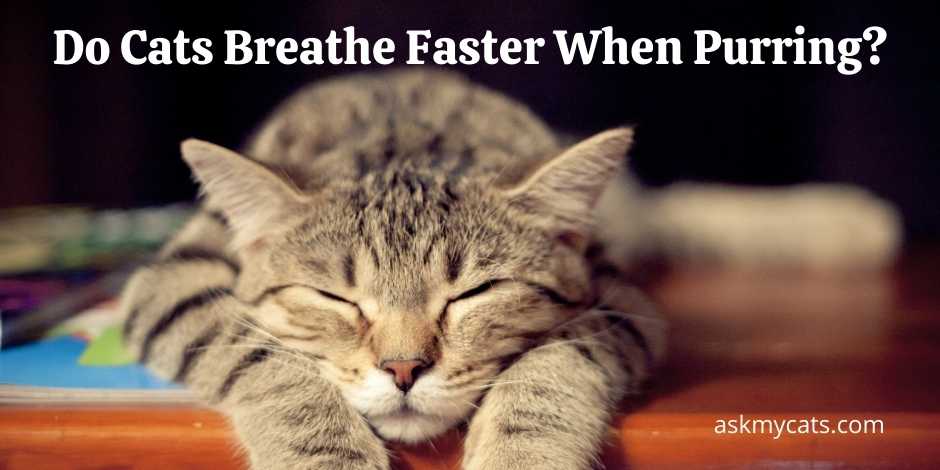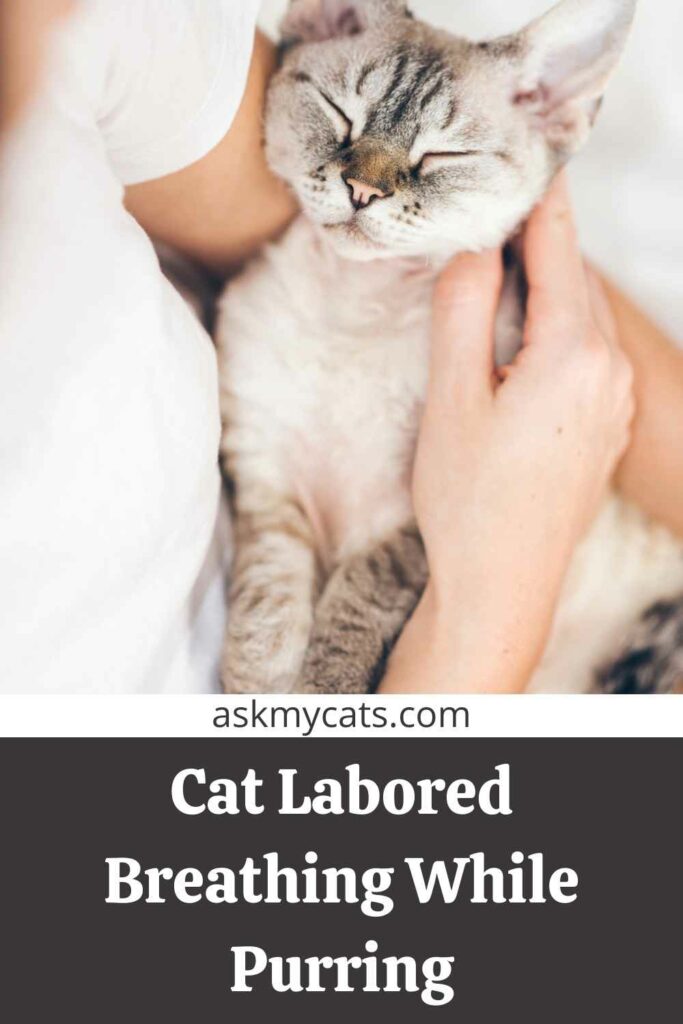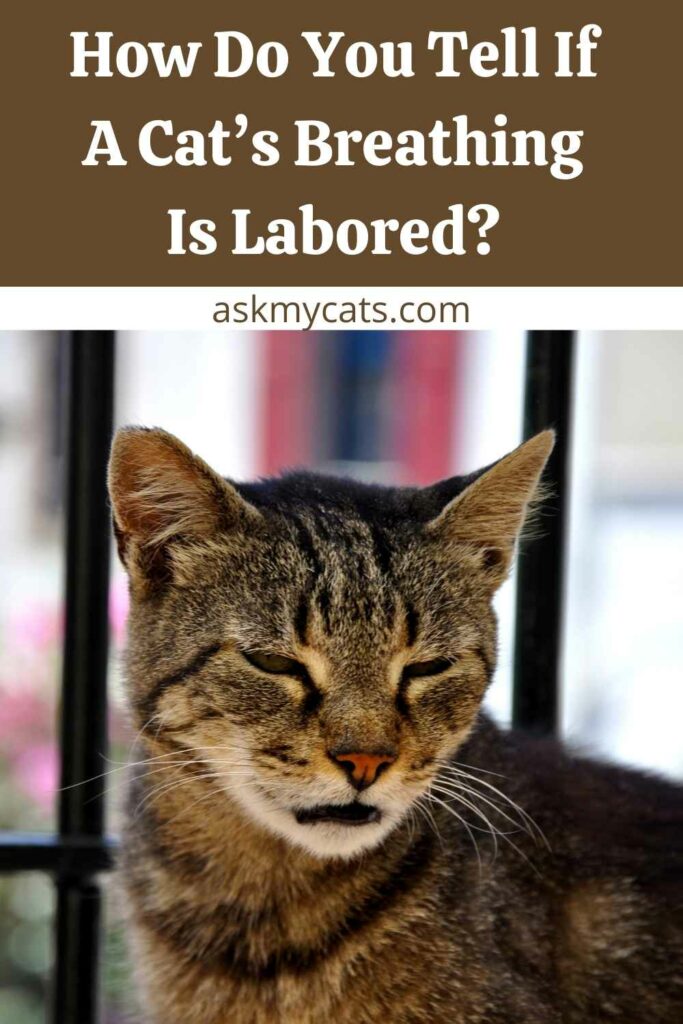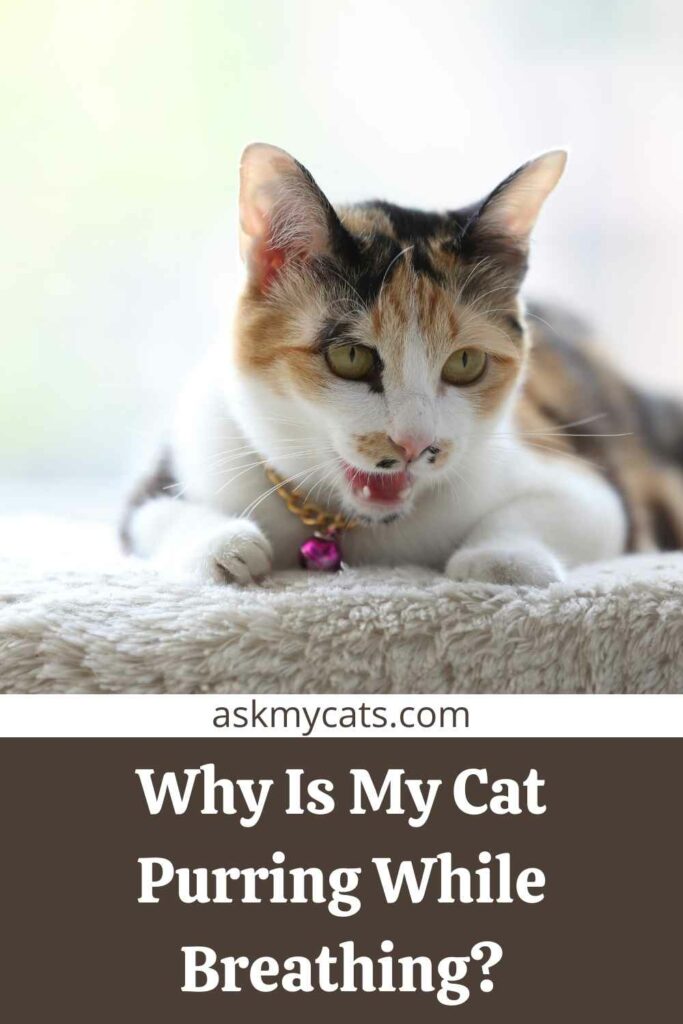Purring is one of the most satisfying noises a cat can produce. Purring is breathing with more purpose than you would think.
It’s easy to link that soft murmur with a calm kitten resting as you brush his ears — but purring is a type of breathing with more purpose than you might believe.
The respiratory rate of cats increases when they purr, which is natural. Cats are generally quiet pauses, with no odd sounds coming from their nose, throat, airway, or lungs. Purring is the only familiar sound they make.
A variety of factors can cause breathing difficulties. The best thing to do is schedule an appointment with a veterinarian for an assessment.
Key Takeaways
- Purring is a type of breathing with a purpose, as it can help cats self-heal and may even be used as a form of communication with humans.
- Cats can control their purring to some extent and may use it to request food or other favors.
- However, labored breathing while purring can indicate that a cat is facing respiratory difficulties and should be seen by a veterinarian.


Give Your Cat the Perfect Day
Get the Free Ebook!
Cat Labored Breathing While Purring
Cats make purring sounds while labored breathing as they are facing breathing difficulties.

Purring is a secondary effect of muscle twitching that happens independently of your cat’s breathing. To simplify things, your cat is always breathing.
When he purrs, his brain tells his laryngeal muscles to twitch — and they twitch quickly. So rapidly that each breath splits the vocal cords, resulting in the soft, rolling sound of a purr when your cat breaths while fiddling.
On the other hand, Purring isn’t only a humorous way of breathing; it also provides advantages that you overlook until you’re looking for them.
One of them is that purring may help your cat cure itself, which is why cats purr after giving birth or when they’re unwell. It’s essentially a type of internalized physical therapy.
Yes, your cat is purposefully influencing you by purring to elicit an emotional response. Remember that the urge to purr originates in the brain and can be triggered at any time.
Many cats have gained the tendency to purr because it pleases their human owners after years of domestication.
A sorrowful little cry from your cat might be tucked away in a purr, where you will only detect it subliminally, stimulating your loving instincts. What’s the ultimate result? Food or attention is the answer. Your cat is well-aware of his surroundings.
Not all cats have the ability to purr. It’s a learned and formed behavior that you’ll lose if you don’t employ it. Consider giant cats like lions and tigers, which cannot purr due to their vocal cords.
Cats smaller by contrast, including wild cats such as bobcats, can purr but not roar like more giant creatures.
How Do You Tell If A Cat’s Breathing Is Labored?
You can tell a cat’s breathing is labored by observing whether he faces difficulty or panting excessively while breathing.

Dyspnea is sometimes known as “respiratory discomfort.” Inhaling, exhaling, or both may be difficult for your cat.
Your cat may also be panting loudly or having its jaws wide. Breathing will be quick and shallow in most cases.
Coughing is another symptom that frequently occurs in conjunction with dyspnea. Whatever the cause of your cat’s heavy breathing, they need to see a veterinarian right once since this disease is not treatable at home and can be fatal.
Seeing your cat struggle to take a breath is upsetting. Dyspnea, or trouble breathing, is a symptom of an underlying problem caused by various diseases or medical conditions.
Your cat might, for example, have a foreign item lodged in its nose or be suffering from allergy-induced asthma. Another common cause of breathing issues in cats is heart failure, which needs immediate medical attention.
A cat has problems breathing when it breathes fast with its mouth open. Other respiratory distress signs are more modest yet visible to the sight and ear. Because respiratory issues in cats are severe and can quickly become life-threatening, get veterinarian help right once.
Most likely, your veterinarian will begin by asking you questions about when the breathing problems began, the signs you saw, and what happened before the respiratory distress.
If your cat is suffering major respiratory problems, your veterinarian will give them oxygen before the tests begin.
Taking vital signs and inspecting your cat’s ears, eyes, nose, and gums will assess its overall health.
A stethoscope will be used to listen to your cat’s lungs and chest to see if there is any fluid in the lungs or an irregular heartbeat or murmur. The veterinarian may also palpate the abdominal region.
Also, check out the reasons behind Pregnant Cat Breathing Fast: Is It Normal?
Do Cats Purr When They Breathe?
Yes, cats purr when they breathe.
When cats are in agony, they purr. Tachypnea, or rapid breathing, is another indicator of discomfort. If your breathing is shallow and quick, you may have a lung or thorax issue. Your cat may have pyothorax or something similar. It might also be a lung infection, such as pneumonia.
Your cat breathes quickly because when it purrs, its nose may itch, and it may feel like they’re about to sneeze, so they take deep breaths. When a cat purrs for an extended period, the brain, laryngeal muscles, and voice cords get irritated, leading the cat to inhale and exhale quickly.
Although loud breathing isn’t dangerous in and of itself, the underlying problem might be. If airway obstruction is the cause, total airway obstruction can occur fast, culminating in respiratory failure.
Noisy breathing can be caused by a blockage, constriction, or other difficulties in the nose, mouth, throat, larynx, bronchi, or smaller airways inside the lungs.
A veterinarian should check cats with loud breathing as soon as possible to rule out or diagnose potentially significant medical issues.
Any situation in which breathing is unusually loud is referred to as ‘noisy breathing.’ Without using veterinary equipment, this includes respiration that can be easily heard. Wheezing, snoring, or squeaking are all examples of noisy breathing.
Check out the reasons behind cat breathing heavily while resting
Why Is My Cat Purring While Breathing?
Your cat is purring while breathing because purring causes low-frequency vibrations inside the cat’s body, which relax breathing and relieve tension.

According to scientists, cats purr as a way of calming themselves down, which means they’re just as likely to do it in a stressful or unpleasant scenario as they are when melting onto their owner’s lap.
Purring causes low-frequency vibrations inside the cat’s body, which relax breathing and relieve tension.
But there’s more: experts believe that these vibrations can help heal injuries, restore and grow muscles, and even work as painkillers, which could explain why sick or injured cats prefer to spend their energy purring.
It might also explain why cats recover from surgery more quickly and have fewer difficulties than dogs.
Cats purr by vibrating their voice cords at a frequency of 25-150 vibrations per second utilizing their laryngeal muscles. Air flows across their vibrating vocal cords as they breathe in and out, making a purring sound.
You might be able to hear when your purring cat goes from breathing in to breathing out and back again if you listen intently.
Interesting Read: Why Does My Cat Lay On Me And Purr?
Do Cats Breathe Differently When They Purr?
The purr of a cat is audible, but its breathing is not. It might be a symptom of significant health concern if your cat breathes loudly and differently while purring. Your cat is content if it purrs while breathing normally.
A purr is, without a doubt, one of your cat’s most satisfying noises. The murmur your cat makes while it sleeps or when you touch its ear is a solid indicator of a happy cat.
People used to believe that only domestic cats could purr. More giant cats in the wild, such as pumas, tigers, lions, leopards, and cheetahs, purr as well.
The main difference is that more giant cats purr when they exhale, whereas domestic cats purr both when they exhale and when they inhale.
Air flows across your cat’s vibrating vocal cords as it breathes in and out, making a purring sound. You may hear when your cat switches from breathing into breathing out if you listen closely as they purr.
Cats do not generally breathe with their mouths open unless they are nervous, such as during a vehicle journey. They generally breathe via their nose and are completely quiet while doing so.
You should not hear any unusual sounds emanating from a healthy cat’s nose, throat, or lungs.
To show happiness, they may purr a little while breathing. Purring, unlike breathing, is typically audible and indicates how content your cat is.
Perhaps you’ve prepared their favorite dish, such as tuna, and they’re overjoyed. You’re caressing them in a place they enjoy, such as under the chin or beside their cheeks.
Purring does not affect your cat’s respiratory patterns. Purring is a type of breathing, to put it another way. The brain instructs the laryngeal muscles to twitch rapidly when your cat purrs.
As a result, each breath your cat takes while these laryngeal muscles spasm separates its vocal cords. The end effect is a soft purr.
Some of the Interesting reads regarding cat purring:
- Why Do Cats Purr? The Science of Cat Purring
- Why Doesn’t My Cat Purr?
- How To Make A Cat Purr?
- Why Do Cats Purr When They Are Dying?
- Do Cats Purr When They Sleep?
- Why Does My Cat Purr When He Sees Me?
- Why Is My Cat Purring So Much?
- Why Do Cats Purr When You Talk To Them?
- Why Does My Cat Purr So Loudly?
- Why Do Cats Purr When You Stroke Them?
- Can Cats Control Their Purring?
- Do Cats Purr When They Are Happy?
- Why Do Cats Wag Their Tails While Purring?
- How To Purr Like A Cat?
- Why Do Cat’s Noses Get Wet When They Purr?
- Why Is My Pregnant Cat Purring So Much?
- Why Does My Cat’s Purring Sound Congested?
- Why Do Cats Purr And Knead?
- Differences In Purring Between Cat Breeds
- Why Does My Cat Purr And Bite Me?
- Do Cats Purr When They Are Sick Or In Pain?
- Do Feral Cats Purr?
Frequently Asked Questions
How do you tell if a cat is breathing normally?
You must first determine a healthy respiratory rate (breathing) for a cat, which is 16 to 40 breaths per minute while the cat is relaxing or sleeping. 1 Small chest motion should accompany each breath; if your cat’s sides move a lot, this might suggest strained breathing.
Why my cat does purring sound like breathing?
During inhaling, the stertor is a loud breathing pattern. It’s a low-pitched snoring sound caused by fluid vibrations or the vibrations of relaxed or flabby tissue. It is caused by an obstruction in the throat’s airway (pharynx).
Should I be able to hear my cat breathing?
Unless you look and listen attentively, you shouldn’t be able to hear or see your cat breathing. You may notice your cat breathing loudly, fast, coughing, taking tiny shallow breaths, or, in difficult situations, mouth breathing if they have a respiratory problem (panting).
Final Words
Purring can suggest two different emotions: anguish or delight, making it difficult to determine what is expected and what is not.
On the other hand, a qualified veterinarian can tell if the breathing is quick or regular. Remember to provide your doctor with a complete medical history of your cat, including when the symptoms began. It’s also crucial to specify if your cat is an inside or outdoor cat.
Must Read: Cat Purring Effect On Humans: The Power of Cat Purring
Interesting Read: Why Does My Cat Drool When He Purrs?
